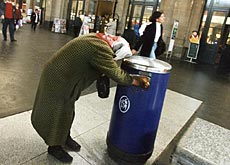Swiss society comes under pressure

Experts from opposing sides talk to swissinfo about the increasing number of poor people in Switzerland and what impact this could have on society.
Recent figures published by the federal authorities show that one million Swiss people – about one in seven – live in impoverished conditions.
Pierre Weiss is a sociologist at Geneva University and sits on the cantonal parliament for the centre-right Radical Party.
His colleague Franz Schultheis heads the faculty of sociology at Geneva University.
swissinfo: Considering the growing gap between high and low salary earners, more and more unemployment among the young and spiralling health care costs, do you agree that the Swiss are under increasing pressure?
Pierre Weiss: Generally speaking we are witnessing the end of a period of continuing improvement in individual living standards since the 1990s.
But the welfare state, including health insurance coverage, has expanded since the 1970s.
As a result the average citizen now has less money to spend. It is a way of spreading the income across society.
I’m not really sure who are the winners and who are the losers. Are we worse off today compared with the situation ten or 50 years ago?
Franz Schultheis: People are coming under increasing pressure. We’re heading towards more uncertainty in the job market, albeit on a high level. And Switzerland remains in a very privileged position.
Major tensions have put a strain on Switzerland’s neighbours, France, Germany and Italy. Our society is not subject to the same tensions but the general trend is identical: a growing divide between rich and poor, as well as the uncertain job situation.
Based on the latest data, some experts argue that Switzerland has a steady stock of working poor. This means that low salaries have not gone up while at the same time the costs of living have increased.
More and more people fall into this category. They work hard but still find it impossible to make ends meet and to pay the monthly rent, the social security premiums or the phone bills.
swissinfo: People seem to feel that things aren’t going as well as they used to…
P.W.: It is interesting and also worrying to see the difference between reality and how it is perceived.
F.S.: I’ve noticed a feeling of general uncertainty. Also about seeing privileges, services and certain living standards disappear. It’s an alarm signal that has to be taken seriously.
swissinfo: Is there a limit to how much pressure society can take and how much longer before it begins to fall apart?
F.S.: In the 19th century there were all kinds of predictions about an imminent revolution because of the growing number of impoverished people. These gloom-and-doom prophecies were all proven wrong and I’m not going to make the same mistake.
But it’s obvious there will be a price to pay for a society that believes it can allow social differences to show openly and inequalities to get more marked.
The price is that people who lose out often develop psychological problems and psychosomatic illnesses. This can also affect their families.
I don’t see a revolution breaking out in the near future. But we have to be prepared to pay the price, above all a symbolic price, at the cost of social cohesion.
P.W.: Judging by the number of collective labour contracts – that is the general labour conditions – the moment of truth has not yet come.
If we take recent votes as a benchmark, we get a different picture. There are clear signs of discontent that must not be ignored.
There is a trend towards more polarisation in politics. The rightwing Swiss People’s Party and the centre-left Social Democrats have attracted more voters because they like to play the card of the opposition but still be members of the four-party government.
But this feeling of discontent is unlikely to become more acute unless it leads to the establishment of a proper movement.
swissinfo-interview: Pierre-François Besson
Average wealth of citizens in Swiss francs (source: World Bank):
Switzerland: 817,000
Denmark: 725,000
Sweden: 647,000
United States: 646,000
Germany: 626,000
Guinea-Bissau: 5,015
Nepal: 4,800
Niger: 4,663
Burundi: 3,608
Ethiopia: 2,480
In 2004 12.5% of the resident population in Switzerland – one in eight people – lived in poverty, according to data published by the Federal Statistics Office.
The charity Caritas called for increased efforts to improve the social insurance system.
The official poverty line is an income of SFr2,480 ($1,940) for a single person residing in Switzerland.

In compliance with the JTI standards
More: SWI swissinfo.ch certified by the Journalism Trust Initiative










You can find an overview of ongoing debates with our journalists here . Please join us!
If you want to start a conversation about a topic raised in this article or want to report factual errors, email us at english@swissinfo.ch.